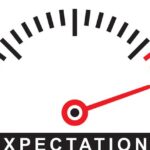Setting expectations for your children is an essential responsibility of being a ski racing parent. Expectations communicate messages to your children about what’s important to you and establish a standard toward which they can strive. But expectations can be double-edged swords. They can be a tremendous benefit to your children’s ski racing and personal development, or they can be heavy burdens that crush their motivation for and enjoyment of our sport and, ultimately, hurt their self-esteem and their healthy growth into successful and happy adults. The impact that expectations have on your ski racing children depends on the type of expectations you set for them.
Unhealthy Expectations
There are two types of expectations that you shouldn’t set for your children: ability and outcome expectations. Ability expectations are those in which children get the message that you expect them to achieve a certain result because of their natural ability, “We expect you to win because you’re the most talented racer out there.” The problem with these messages is that children have no control over their ability. Children are born with a certain amount of ability and all they can do is maximize whatever ability they are given. The fact is that if your children aren’t meeting your ability expectations, you have no one to blame but yourself—you didn’t give them good enough genes! Plus, because your children have no control over their ability, it is pointless to even talk about it. Another problem with ability expectations is that if children attribute their successes to their ability—“I won because I’m so gifted,”—they must attribute their failures to their lack of ability—“I lost because I’m a lousy racer.”
Our culture also conveys the message that results matter above all else (more on this in the next section). As a consequence, parents often set outcome expectations in which the message is that their children must produce a certain result—“We expect you to win this race” or “We know you’ll qualify for the championships.” The problem is that, once again, children are asked to meet an expectation over which they may not have control. They might ski to the best of their ability but still not meet their parents’ outcome expectations because other racers just happened to be faster than they were that day. So, they would have to consider themselves failures despite their good skiing. Setting outcome expectations also communicates the bigger message to your children that you value results over everything else, so they’ll come to judge themselves by the same standards. Contrary to what you may believe, ability and outcome expectations actually hinder your children’s ski racing and personal development.
But Results Do Matter!
Now you might be thinking, “Wait a minute! I can’t push my kids to get good results? No way I’m buying this one.” Before you jump all over me, give me some latitude to bring all these ideas back to the real world.
Here is a simple reality that we all recognize in our culture: results matter! Your children don’t get ahead because they are nice (though that is a very good quality to have) and they don’t get ahead because they work hard (though hard work is necessary). No two ways about it, your children will get ahead in their ski racing only by getting good results (and, by extension, grades and test scores in school). Though it would be great if young racers were rewarded for their good intentions or efforts, that is simply not the way the world works. Unfortunately, this societal message can cause parents to place their desire for their children to get results in the short run ahead of their long-term development, the result of which is interference rather than encouragement in their children’s growth.
Outcome Goals, not Expectations
I would recommend that you give up outcome expectations all together, but still give your children outcome “somethings.” Those somethings I refer to are outcome goals. Goals are very different from expectations. Outcome expectations are often set by parents and placed in front of their children without their consultation or “buy in.” There is almost always an implied threat with outcome expectations: “If you don’t live up to our expectations…we will be very, very disappointed.” And kids often feel dragged—sometimes kicking and screaming—toward those expectations. Children have no ownership of expectations and little motivation, outside of that implied threat from their parents, to fulfill the expectations. When I ask children about expectations, they usually grimace and send a very clear message, “They’re telling me what to do and I better do it, or they’ll be mad at me.” Not exactly “feel-good” parenting! The message of outcome expectations are also black and white; your children either meet the expectation and succeed or they don’t, and they fail. So, there is very little opportunity for success and lots of room for failure.
Goals are very different. One of the great joys in life is to set, work toward, and achieve a goal. Children have ownership of their goals and want to set and strive toward goals for themselves, with guidance from parents, teachers, and coaches. For example, “After making the top-20 last season, my goal is to finish in the top-5 in the slalom at U16 Nationals this winter.” One great thing about goals is that they aren’t black and white, but rather about degree of attainment. Not every goal can be achieved, but there will almost always be improvement toward a goal and that progress defines success. So, if children give their best effort, there is little chance of failure and great opportunity for success. When I ask kids about goals, they convey a very different message compared to expectations. Their faces perk up and they say things like, “It means I decide to do something, and I want to really work hard to do it.”
For example, a racer’s parents established an outcome expectation of that top-5 U16 finish I just mentioned, but she ended up finishing 8th in the slalom. Unfortunately, she would have failed because she didn’t meet the expectation. But if she set an outcome goal of a top-5 U16 finish, even though that goal wasn’t fully realized, she would still see the result as a success because of the substantial improvement she made over last year’s race.
But even outcome goals aren’t ideal. Many parents think that focusing on the outcome will increase the chances of that outcome occurring, but the opposite is actually true. Here’s why. When does the outcome of a race occur? At the finish, of course. And if children are focusing on the end of the race, they aren’t focusing on the process, that is, what they need to do to get from the start to the finish as fast as they can. Here’s the irony. By focusing on the process rather than the outcome, your children will more likely ski well and, if they ski well, they’re more likely to achieve the outcome you wanted in the first place. Also, why do children get nervous before a race? Because they’re afraid of the outcome, more specifically, they’re afraid of failure. So, by getting them focused on the outcome, they’re more likely to get nervous and, as a result, will be less likely to ski well and achieve the outcome you wanted for them.
So, if you’re going to send messages about outcome somethings, make sure they are outcome goals, but then immediately send other messages that encourage your children to focus on the process, that is, what they need to do to achieve their outcome goals.
Value & Effort Expectations
Instead of focusing on results, you should communicate messages about value and effort expectations, over which they have control and that actually encourage them to do what it takes to achieve the outcomes you want. If your children ski race because of healthy values that you have instilled in them for example, passion, joy, meaning, commitment, discipline, patience, focus, persistence, and perseverance, that will act as positive fuel that will propel them toward their outcome goals. Instead of an anchor of ability and outcome expectations that weigh your kids down, value expectations are like sails that will lift them up and drive them forward.
Also, with these value expectations fueling your young racers, you really don’t even need effort expectations because they will naturally want to express their value expectations in significant effort toward their goals. Think about how your children will express committed effort to their ski racing goals: plenty of sleep, healthy eating, committed physical conditioning and on-snow training, mental training, and a consistent race-day routine, and much more.
Specific value expectations might include: “Our family values your having fun and giving your best effort.” Or, “We expect you to make decisions around your ski racing.”
Notice that I use “our family” instead of “we your parents.” This subtle change in language communicates several important messages. It removes the source of the message being the parent, focuses it on the children, and establishes the message as a collaboration between you and them. This cooperative messaging ensures that your children, as a member of the family, have ownership of the expectations rather than feeling that you have imposed the expectations on them.
If your children meet your value and effort expectations, they will, in all likelihood, experience the intrinsic rewards garnered from their efforts. Just as importantly, they are more likely to ski well and get the result both of you want. If your children don’t meet the value and effort expectations, they will be disappointed (that is a natural and normal reaction). But rather than being crushed by failure, they will know that they have the power to fulfill the expectations and achieve the results they want in the future.






